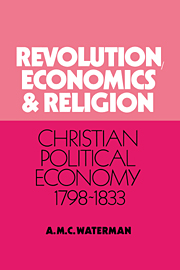Book contents
- Frontmatter
- Contents
- List of figures
- Acknowledgements
- Abbreviations
- 1 POLEMIC, IDEOLOGY AND ‘CHRISTIAN POLITICAL ECONOMY’
- 2 THE FIRST ESSAY ON POPULATION: POLITICAL ECONOMY
- 3 THE FIRST ESSAY ON POPULATION: THEOLOGY
- 4 THE RECONSTRUCTION OF MALTHUSIAN THEODICY: PALEY AND SUMNER
- 5 OXFORD CONTRIBUTIONS: COPLESTON AND WHATELY
- 6 CHALMERS AND THE ESTABLISHMENT
- 7 THE END OF CHRISTIAN POLITICAL ECONOMY
- Appendices: The Malthus–Chalmers model of stationary equilibrium
- Bibliography
- Index
7 - THE END OF CHRISTIAN POLITICAL ECONOMY
Published online by Cambridge University Press: 27 August 2009
- Frontmatter
- Contents
- List of figures
- Acknowledgements
- Abbreviations
- 1 POLEMIC, IDEOLOGY AND ‘CHRISTIAN POLITICAL ECONOMY’
- 2 THE FIRST ESSAY ON POPULATION: POLITICAL ECONOMY
- 3 THE FIRST ESSAY ON POPULATION: THEOLOGY
- 4 THE RECONSTRUCTION OF MALTHUSIAN THEODICY: PALEY AND SUMNER
- 5 OXFORD CONTRIBUTIONS: COPLESTON AND WHATELY
- 6 CHALMERS AND THE ESTABLISHMENT
- 7 THE END OF CHRISTIAN POLITICAL ECONOMY
- Appendices: The Malthus–Chalmers model of stationary equilibrium
- Bibliography
- Index
Summary
Chalmers's Bridgewater Treatise is the terminus ad quem of Christian Political Economy. After 1833 he was increasingly engaged with the ecclesiastical politics, first of his campaign for church extension, and later of his unsuccessful attempt to prevent the ‘intrusion’ by lay patrons of unpopular clergymen into benefices of the Church of Scotland. He wrote no substantial work of any consequence for Christian Political Economy in the last fifteen years of his life. The Sufficiency of a Parochial System (1841) was based upon theological lectures in Edinburgh and contained nothing new. His posthumous Institutes of Theology (1847), composed in the form of an extended evangelical sermon, ‘has been a disappointment to many of his supporters’ (Brown 1982, 377).
Even before 1833 Chalmers's communication with and intellectual relation to the other authors considered in this book were slight. He seems to have met Whately only once, and though duly impressed, reported to his wife that he found the people in Oxford ‘all love better to speak than to hear’ (Hanna 1849–52, III, 279). There are no references to Whately in Political Economy and only one in the Bridgewater Treatise; and as I have suggested above, Chalmers seems not to have grasped the importance either of Whately's demarcation between ‘scientific’ and ‘religious’ knowledge, or of his objection to utilitarian ethics. Even more surprising in view of their common evangelicalism, is the seeming unimportance of Sumner and his work to Chalmers's own enterprise.
- Type
- Chapter
- Information
- Revolution, Economics and ReligionChristian Political Economy, 1798–1833, pp. 253 - 263Publisher: Cambridge University PressPrint publication year: 1991

